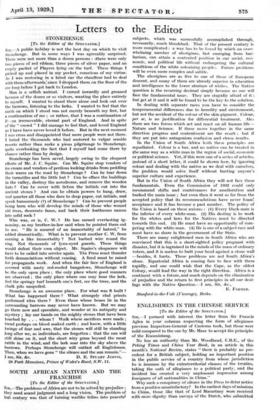Letters to the Editor
STONEHENGE
[To the Editor of the SPECTATOR.]
Sut,—A public holiday -is- not the best day on which to visit Stonehenge. But in some ways I was agreeably surprised. There were not more than a dozen persons :.there were only two pieces of red ribbon, three pieces of silver paper, and an empty packet of Playen lying on the turf. These things I picked up and placed in my pocket, conscious of my virtue. As I was - motoring in a • hired car the chauffeur had to deal with them afterwards; since I dropped them on the floor of the ear long before I got back to London.
Man is a -selfish animal. I -cursed inwardly and groaned because of the dozen or so visitors, wanting the place entirely to myself. - I wanted to stand there alone and look out over the barrows, listening to the larks. I wanted to feel that the earth on which I stood was not merely beneath my feet, but a continuation of me ; or rather, that I was a continuation of it—an irremovable, eternal part of England. And in spite of the " crowd " I did manage to feel that, and loved England as I have have never loved it before. But in the next moment I was cross and disappointed that more people were not there. I hated the thousands who had motored to vulgar seaside resorts rather than make a pious pilgrimage to Stonehenge, quite overlooking the fact that -I myself had come there by chance rather than by design.
Stonehenge has been saved, largely owing to the eloquent efforts of Mr. J. C. Squire. Can Mr. Squire stop vendors of ice cream and vendors of perilous looking drinks from peddling their wares on the road by Stonehenge ? Can he tear down the turnstiles and the little but ? Can he efface the buildings in the valley, destroy the aerodrome, and remove the wooden huts ? Can he cover with lichen the initials cut into the ancient stones ? And can he-obtain powers to hang, draw, and quarter all those who dare to drop paper, cut initials, and speak humorously (?) of Stonehenge ? Can he prevent people being born who will develop the minds of those who wound old trees, desecrate fanes, and hack their loathsome names into solid rock ?
Who was, or is, C. W. ? He has earned everlasting ig- nominy, as my brother-in-law said when he pointed them out to me. " He is assured of an immortality of hatred," he added dramatically. What is to prevent another C. W. from earning a like immortality ? Not barbed wire round the ring. Not thousands of lynx-eyed guards. These things would defeat their own object. Mr. Squire's eloquence will have to be called into service again. The Press must thunder forth denunciations without ceasing. A fund must be raised for propaganda work. And when the fair face of England is covered with nasty red-roofed bungalows, Stonehenge will be the only open place ; the only place where good manners are observed ; the only place where one may hear the lark, feel the springy turf beneath one's feet, see the trees, and the chalk pits unspoiled.
Stonehenge is an awesome place. For what was It built ? What has happened there ? What strangely clad priests performed rites there ? Even those whose bones lie in the surrounding barrows may never have known. But we may go there now and speculate, and wonder at its antiquity and mystery ; lay our hands on the mighty stones that have been touched by . . . whom ? Walk where sacrifices were made ; tread perhaps on blood soaked earth ; and know, with a little twinge of fear and awe, that the stones will still be standing long after we, as individuals, are forgotten : that the sun will still shine on it, and the short wiry grass beyond the moat rattle in the wind, and the lark soar into the sky above the barrows. Perhaps Stonehenge will outlast all Englishmen. Then, when we have gone " the silence and the sun remain."—


















































 Previous page
Previous page